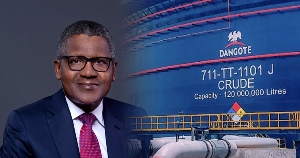Nigeria imported about 15.01 billion litres of Premium Motor Spirit (petrol) between August 2024 and the first 10 days of October 2025, representing nearly 69 per cent of the total national petrol supply during the 15-month period. This is despite the fact that the Dangote refinery started petrol production in September 2024.
Figures from the Nigerian Midstream and Downstream Petroleum Regulatory Authority show that total PMS supply for the period stood at 21.68 billion litres, with 6.67 billion litres, or 31 per cent, coming from domestic refining. The data, titled Import vs Domestic Supply Performance (PMS Daily Average Supply – August 2024 to October 2025), captured supply trends over 15 months, highlighting the gradual rise in local production and a corresponding drop in imports.
According to the breakdown, imported petrol averaged 44.60 million litres per day in August 2024 and rose to 54.30 million litres per day in September 2024, marking the peak of import dependence during the period. This was a time when the Dangote refinery began PMS supply to the local market.
It was noted that imports began to decline steadily, falling to 24.15 million litres per day by January 2025, 19.26 million litres per day in September 2025, and 15.11 million litres per day within the first 10 days of October 2025.
The decline in petrol imports showed that the Dangote refinery is gradually taking a significant share of the market, but this comes with stiff competition from petrol importers, who repeatedly accused Aliko Dangote of stifling competitors with consistent price reductions.
As domestic refining grew consistently through the period, local production, which stood at 6.43 million litres per day in September 2024, increased to 22.66 million litres per day in January 2025 before stabilising around 20 million litres per day in subsequent months. By October 2025, the Dangote refinery was producing an average of 18.93 million litres per day, exceeding imports for that month.
The data also showed notable supply fluctuations across the months as total daily PMS supply peaked at 60.73 million litres in September 2024 before dropping to 44.08 million litres in April 2025 and further to 34.04 million litres by October 2025. The variations reflected shifts in both import availability and refinery operations.
This is an indication that daily consumption has dropped significantly from an average of 60.73 million litres per day in September 2024 to 51.57 million litres in July 2025, 41.86 million in August, 34.86 million in September and 34.04 million per day in the first 10 days of October 2025.
Recall that the Federal Government totally deregulated the petrol sector in September last year, stopping the controversial fuel subsidies which the Nigerian National Petroleum Company Limited was paying on imported petrol.
A month-by-month analysis revealed that the highest domestic output was recorded in January 2025, with a daily average of 22.66 million litres, while the lowest was in August 2024, when no local production was recorded because Dangote had yet to commence production at that time.
The highest total supply was in September 2024 at 60.73 million litres per day, followed by October and November 2024, when total daily supply averaged 56.01 and 55.75 million litres, respectively. By the end of the review period, cumulative petrol imports had reached 15,009.85 million litres, while domestic production amounted to 6,672.44 million litres, giving a combined total of 21,682.29 million litres supplied over the 445 days between August 2024 and October 1-10, 2025.
The figures underline the ongoing transition in Nigeria’s petrol supply structure, showing a gradual but measurable increase in the contribution of domestic refining. However, the data also confirmed that imports continued to dominate the national supply mix for most of the period.
It could be recalled that while marketers insisted on importation, the Dangote refinery has been exporting petrol to other countries, including the United States. The 650,000 refinery has consistently boasted of its capacity to meet local fuel demands while exporting to foreign countries.
Aliko Dangote’s plan for building the refinery was to end Nigeria’s dependence on imported fuel despite being an oil-producing nation. However, marketers have continued to import petrol into Nigeria, competing heavily with the refinery.
Recently, the Dangote refinery challenged marketers to bring their trucks for fuel loading, boasting that it has over 310 million litres of petrol in its ranks. The Vice President of the Dangote Group, Devakumar Edwin, stated that marketers were allowed to bring any trucks for loading at the gantry, as the refinery had enough fuel for the local market and for exports.
“I have more than 310 million litres of PMS as of today inside my tanks, apart from the production which is coming out every day. Bring your tankers. We will load. Any number of tankers you bring, we’ll load. It’s a challenge I’m throwing today. No one can come and tell me I’m not loading. We can load any number of tankers you bring. So, you can see whether I have the capacity to produce or not. We have more than 310 million litres as of now,” he stressed.
The Dangote refinery had in September exported more fuel to foreign nations when Saudi Aramco and others in the Middle East Gulf closed refineries for maintenance.
A senior officer at the Dangote refinery told our correspondent that the $20bn Lekki-based plant exported large volumes of Premium Motor Spirit (petrol), aviation fuel, and diesel to other countries in August.
The official, who spoke in confidence as he was not authorised to speak with the press, said, “We export PMS, diesel and aviation fuel.”
Our correspondent gathered that the Dangote refinery had supplied two long-range cargoes of fuel to the Mideast Gulf region between June and July. According to Argus Media, a heavy refinery turnaround season in the Mideast Gulf was expected to exacerbate an already tight gasoline market in the fourth quarter, prompting key regional suppliers to boost imports.
In February, the Dangote refinery said it sold two cargoes of aviation fuel to Saudi Aramco. Aliko Dangote announced that the refinery achieved a significant milestone by successfully exporting the two cargoes of jet fuel to Saudi Aramco, the world’s largest oil producer.
Dangote said the refinery was reaching the ambitious goals it set for itself as it ramps up production.
“We are reaching the ambitious goals we set for ourselves, and I’m pleased to announce that we’ve just sold two cargoes of jet fuel to Saudi Aramco,” he said in February, adding that since its production began in 2024, the refinery has steadily increased its output.
Some months ago, he disclosed that the oil refinery had begun exporting PMS to other countries of the world. According to him, between June and July 2025, the refinery exported up to one million tonnes of petrol.
“Today, Nigeria has actually become a net exporter of refined products. From the beginning of June to date (July 22), we have exported about one million tonnes of PMS within the last 50 days,” he said.
The NMDPRA also testified that the Dangote refinery supplies an average of 20 million litres of petrol into the local market.
“Without a shadow of a doubt, the operation of the 650,000-barrel-per-day Dangote refinery has changed the supply dynamics, with an average daily contribution of up to 20 million litres, undoubtedly with potential for a future ramp-up,” NMDPRA Chief Executive, Farouk Ahmed, said recently in Lagos.
The data underscores Nigeria’s ongoing transition from heavy reliance on imported petrol to a more balanced supply structure driven by domestic refining. While the country still depends significantly on foreign fuel, the steady growth in local production, particularly from the Dangote refinery, signals a gradual shift toward self-sufficiency.
However, the competition between importers and the refinery, coupled with market pricing challenges, suggests that achieving full local dominance will take time. With refining capacity expanding and consumption patterns adjusting, Nigeria appears to be entering a new phase in its downstream petroleum landscape, one defined by increased domestic output, reduced imports, and the potential to finally end decades of fuel dependence.
Business News of Thursday, 23 October 2025
Source: www.legit.ng
Nigeria imports 15bn litres of petrol despite Dangote refinery output
 Chief Executive of the Nigerian Midstream and Downstream Petroleum Regulatory Authority, Farouk Ahme
Chief Executive of the Nigerian Midstream and Downstream Petroleum Regulatory Authority, Farouk Ahme
Entertainment











